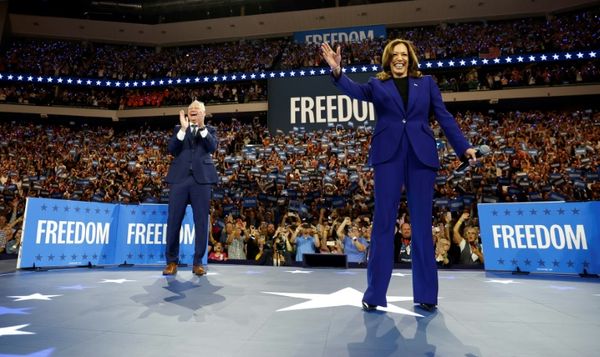
Every morning, Katie and Graham Tatham wake up with hope. Perhaps today will be the day they get the call from the transplant team. Their three-year-old son, Ralph, has liver cancer and his doctors say he will survive if he has a multi-organ transplant: a new liver, pancreas and intestines.
Sina and Jay Patel also have hope, of a different kind. Their son, Aari, died at three after an accident, and his organs were donated to two children in Ralph’s situation. The fates of the girl and boy who Aari helped are never far from their thoughts.
“We received a letter about three years after Aari donated his organs from the mother of the child who had Aari’s heart,” Sina said. “It was amazing to receive that letter and to know that little girl was doing well. She had started back at school (she had spent most of her younger years away from school) and that reconfirmed this was the right thing for us to have done.”
The two families are coming together this week to support an NHS campaign – Consider This – to encourage people to think about making the same choice as Jay and Sina. Today, 243 children are waiting for a transplant but many will not get one. In 2021-22, there were only 40 organ donors under 18. For adults, there is now a presumption of consent – although relatives are consulted and people can join an opt-out register – and in the last 10 years, about 10,000 adult donors have saved 25,000 lives in the UK.
For children, parents are always asked for consent before organ donation, and the latest figures show 52% of families agreed. The Tathams and the Patels, as well as the NHS Blood and Transplant teams, would like more people to say yes.
“We’re not saying: ‘You have to go and donate organs,’” said Katie. “It’s encouraging people to think about it even if they don’t want to. I don’t know if it’s because we’re British, but it just seems to be a very difficult conversation for people to have.”
The two sets of parents have met each other for the first time – with the Observer – to try to kickstart those difficult conversations. What is it like to be asked to donate your child’s organs? Why would people decide not to? Does a transplant family realise how much their donor’s relatives want them to do well? And how do parents cope with the guilt of knowing that the only way to fulfil their hopes is for someone else’s to be swept away?
People who can bring themselves to address those questions are more likely to agree to donate. In cases where a child was already on the NHS organ donor register, no family went against this known decision to support donation.
Sina and Jay had ticked a box on a driving licence application. “People don’t talk about the death of a child,” Jay said. “We never thought Aari would die. There was never a time when we felt we needed to discuss it.”
Aari was like Ralph in many ways, the boys’ parents agree, both having a cheeky smile and a happy nature. Aari helped one of his younger twin sisters learn to walk – the girls talk proudly now of their brother’s donations – and he told his grandmother: “I’m going to make my mum and dad very proud-ee of me.” (“He couldn’t say ‘proud’, just ‘proud-ee’,” Sina said).
Then one ordinary Sunday evening in November 2016, there was an accident at home. “I knew from the outset this was not going to end well,” Sina said. “But you live in hope. You’re hoping that someone is going to do something, there’s going to be some drug, some injection.”
After two days at Aari’s bedside, in the small hours of the morning, the parents talked. “I looked at Jay and I just said: ‘Would you consider organ donation?’”
Jay described it as the easiest decision they had ever made. Central to their decision was their thoughts about what other families might be going through.
“I thought maybe there’s another child, in another ward somewhere, who is desperately waiting for an organ,” Sina said. “Who am I to deny them that chance? We knew he was never going to get to go to primary school. Whoever has his organs can take the next step.
“We still grieved, but it changed the focus a little bit. It gives us hope that he’s left this small part of him out there and he’s got this legacy that carries on.”
Having spent time in the last seven years talking about Aari and discussing organ donation with other people, Sina and Jay have some insight into what holds people back.

“Perhaps I shouldn’t ask this, but do you think sometimes people say no because it’s hard to let go?” asked Katie. Parents want to do everything they can for their child and hope there might be a miracle. “Maybe holding on to that hope stops them.”
Giving parents time to absorb bad news is important – not every doctor gets this right, Sina said, but specialist organ donation nurses are brilliant at helping parents understand what is involved.
NHS researchers are often told by relatives who say no that they felt the child had “suffered enough”. Jay believes that some people do not know what happens during retrieval surgery and fear they might not get their child back.
“Aari spent five hours in theatre, and when he came back he just had two plasters on him, but they had retrieved seven organs,” he said. The couple held Aari in their arms, surrounded by their family, and said goodbye to him. “He was still our son.”
For Ralph and his family, the campaign is their best hope. They are all isolating at home, trying to avoid any chance of an infection that would prevent a transplant operation.
“One of the saddest things I keep thinking about is that in the first two years of his life, we were mostly locked down,” Graham said. “He didn’t go to nursery as early as we would have liked. He was very much the quiet, shy type – it’s only in the last year he’s become a cheeky chappie.”
Ralph, in spite of 10 gruelling rounds of chemotherapy, tells silly jokes and is warming to his 10-week-old baby brother, offering him toys to play with.
“The hardest thing now is that, before, it felt like the doctors could do something,” Katie said. “He was on a treatment plan. But now we’re just in a situation where nobody knows. It’s just fate. We’re waiting to see if something comes in time, before the cancer spreads. You wake up in limbo, not knowing what’s going to happen.”







